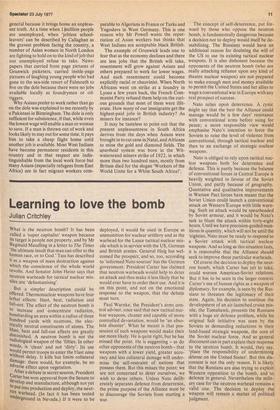Learning to love the bomb
Julian Critchley
What is the neutron bomb? It has been called a 'super capitalist' weapon because its target is people not property, and by Mr Reginald Maudling in a letter to The Times 'the ultimate insult that man can offer to the human race, or to God.' Tass has described It as a weapon of mass destruction against Which the conscience of the whole world revolts. And Senator John Heinz says that neutron warheads for tactical nuclear missiles are 'dehumanising'.
But a simpler description could be offered. Thermonuclear weapons have four lethal effects; blast, heat, radiation and fall-out. The effect of the neutron bomb is to increase and concentrate radiation, bombarding an area within a radius of three hundred yards with neutrons, the electrically neutral constituents of atoms. The blast, heat and fall-out effects are greatly diminished. A neutron bomb is not the radiological weapon of the 'fifties. In other words, is `clean' and not 'dirty'. Its use would permit troops to enter the blast zone without delay. It kills but limits collateral damage: there would, for example, be no adverse effect upon vegetation. After a debate in secret session, President Carter has won approval frpm the Senate to develop and manufacture, although not yet to put into production and deploy, the neutron vvarhead. (In fact it has been tested underground in Nevada.) If it were to be
deployed, it would be used in Europe as ammunition for nuclear artillery and as the warhead for the Lance tactical nuclear missile which is in service with the US, German and British armies. General Haig has welcomed the prospect, and so, too, according to `informed Nato sources' has the German government. President Carter has claimed that neutron warheads would help to deter an attack and thus make it less likely that he would ever have to order their use. And it is on this point, and not on the emotional response to the weapon, that the debate must turn.
Paul Warnke, the President's iirms control adviser, once said that new tactical nuclear weapons, cleaner and capable of more. controlled devastation, would be `an absolute disaster'. What he meant is that possession of such weapons would make their use more likely. He is quite right, but he has missed the point. He is suggesting — as do other opponents of the neutron bomb — that weapons with a lower yield, greater accuracy and less collateral damage will undermine the self-restraint of nations that possess them. But this misses the point: we are not concerned to deter ourselves, we wish to deter others. Unless Nato deliberately separates defence from deterrence, the prime purpose of the Alliance must be to discourage the Soviets from starting a war.
The concept of self-deterrence, put forward by those who oppose the neutron bomb, is fundamentally dangerous because a decision not to deploy would itself be destabilising. The Russians would have an additional reason for doubting the will of the US to use its existing taetical nuclear weapons. It is also dishonest because the opponents of the neutron bomb (who are really attacking reliance upon any kind of theatre nuclear weapon) are not prepared to make enough men and money available to permit the United States and her allies to wage a conventional war in Europe with any real prospect of success.
Nato relies upon deterrence. A cynic might say that the best the Alliance could manage would be a few days' resistance with conventional arms before suing for peace; a more responsible view would emphasise Nato's intention to force the Soviets to raise the level of violence from conventional, through tactical nuclear and then to an exchange of strategic nuclear weapons.
Nato is obliged to rely upon tactical nuclear weapons both for deterrence and defence. This is partly because the balance of conventional forces in Central Europe is heavily weighted in favour of the Soviet Union, and partly because of geography. Ouantative and qualitative improvements in Warsaw Pact forces have meant that the Soviet Union could launch a conventional attack on Westernturope with little warning. Such an attack would be spearheaded by Soviet armour, and it would be Nato's task to blunt the attack within forty-eight hours. Until we have precision-guided munitions in quantity, which will not be until the 'eighties, Nato must be ready to respond to a Soviet attack with tactical nuclear weapons. And so long as this situation lasts, it is reasonable that the Alliance should seek to improve these particular warheads.
Of course the decision to deploy the neutron bomb, which Carter has yet to take, could worsen American-Soviet relations. But it has to be seen in the larger context. Carter's use of human rights as a weapon of diplomacy, for example, is seen by the Russians to threaten the legitimacy of their state. Again, his decision to continue the development of an air-launched cruise missile, the Tomahawk, presents the Russians with a huge air defence problem, while his original Salt initiative was seen by the Soviets as demanding reductions in their land-based strategic weapons, the core of the Soviet nuclear force. And so general discontent can in part explain their response to the neutron bomb. It would, they say, 'place the responsibility of undermining détente on the United States'. But this discontent is not the only reason. It is likely that the Russians are also trying to exploit Western opposition to the bomb, and to defence in general. Nevertheless the military case for the neutron warhead remains a valid one. The decision to deploy the weapon will remain a matter of political. judgment.






































 Previous page
Previous page